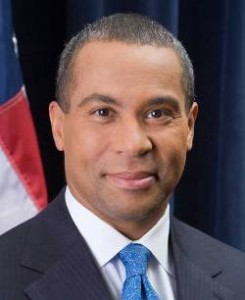Governor Patrick Announces New Plan for Closing MA Student Achievement Gaps
Posted by erik devaneyCourtesy of Associated Press
Governor Deval Patrick has announced several new strategies aimed at closing the most persistent achievement gaps among Massachusetts students.
During Wednesday’s Education Summit at UMass Boston, the Governor outlined significant progress made in closing achievement gaps since the Achievement Gap Act was signed in 2010, and laid out key initiatives that the Administration will pilot in the Commonwealth’s Gateway Cities to ensure that all students are prepared for success in the classroom and beyond.
The Governor’s second term education strategy will focus on four goals:
1. Getting every child to reading proficiency by the third grade
Every child must read proficiently by the third grade. Three-quarters of children who struggle with reading in third grade will continue to struggle academically, greatly reducing their chances of graduating high school, going to college or successfully participating in our high skill economy. To meet the Governor’s goal of reading proficiency by age three, the Administration will create a Kindergarten Readiness Literacy Pilot Program in Gateway City Districts. The program will be designed to support at-risk students with an intensive summer program between pre-k and kindergarten and will place special emphasis on early literacy development.
2. Providing every child with a healthy platform for education
Every child is entitled to a healthy platform for education. In order to benefit from high quality education, students must attend school regularly and be attentive, motivated and ready to learn. The challenges associated with poverty present serious impediments that prevent students from realizing their full academic potential. To combat these challenges, the Administration will create Student Support Councils in all Gateway Cities and provide Student Support Counselors to predominantly low-income schools in Gateway Cities. Support Councils will consist of local human and social service providers focusing their efforts on connecting with students and families in each city’s predominantly low-income schools. Support Counselors will work to connect families and students with service providers who can help them mitigate the problems that impede school attendance and effort.
3. Creating a differentiated education system that meets each student, particularly English Language Learners, where they are
Students need an education system that meets them where they are. Every student should receive the quantity and quality of instruction they need to meet high proficiency standards. In order to better provide students, specifically students for whom English is a second language, with the opportunities, challenge and support needed to be successful, the Administration will pilot Gateway Cities Summer English Learning Program designed to give English Language Learners more time to acquire competence in English. This program will improve learning and close achievement gaps for English Language Learners while establishing the necessity of differentiating between our students and giving those who need it sufficient time to learn English.
4. Preparing all students for college and career success.
Students must be prepared for both college and career success. A successful education system is one that prepares all students for lifelong success. This means establishing multiple pathways through secondary school and college education by exposing our students, early in high school, to career options, giving each student access to quality internships, assessing career readiness and more tightly linking secondary school achievement with college admission. To this end, the Administration will pilot high school career academies in several Gateway Cities to offer high school students the opportunity for early career exploration, more applied learning, and motivating educational experiences.

Governor Deval Patrick
Governor Patrick’s plan also calls for the creation of a statewide Commonwealth Education Innovation Fund, a public-private fund-raising partnership that will strengthen the Commonwealth’s capacity to meet 21st century education challenges. This fund will not be limited to the Gateway Cities.
“The Commonwealth’s record of student achievement is second to none and a model for the nation,” said Governor Patrick. “I am proud of the progress we have made, but we won’t be satisfied until we have a system that prepares all of our students for success.”
Earlier this month, Governor Patrick announced that fourth and eighth graders in the Commonwealth had earned top scores on the National Assessment of Educational Progress (NAEP) exam, which is known colloquially as the “Nation’s Report Card.”
Related posts:
- Governor Patrick Announces New Plan for Helping MA Veterans Find Employment
- Governor Patrick Visits Springfield’s First Innovation School; Welcomes Students Back
- Governor Patrick Breaks Ground on Massachusetts College of Liberal Arts Center for Science and Innovation
- Governor Patrick Announces Seven Appointments to UMass Board of Trustees
- Mass. Launches Online Portal to Help Students Plan for College and Beyond
Short URL: http://www.newenglandpost.com/?p=7554


